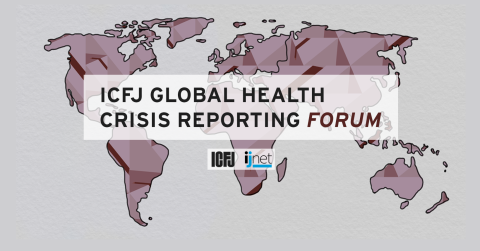
As the novel coronavirus spreads globally, journalists are working in overdrive to provide lifesaving information. Some are doing it under quarantine. Others are up against governments that refuse to disclose data, or in countries with limited access to health experts. All of them face the same health risks they are covering.
At the International Center for Journalists (ICFJ), we are immensely grateful to those reporters. It takes a journalist to provide timely and factual information in a period of great uncertainty, where access to information is literally a matter of life and death. We are committed to helping them in any way we can.
We are rolling out a wide range of resources to help journalists cover this pandemic. Today, we are launching the Global Health Crisis Reporting Forum to connect journalists with some of the world’s top health practitioners, newsroom leaders and other experts, who can answer questions in live video chats. Experts will discuss how to combat misinformation about the pandemic, report safely on COVID-19 and create compelling infographics to relay important information in new ways.
Our first online talk will be a Q&A session on March 24 at 8 am EDT with Dr. Samba Sow, a distinguished public health expert from Mali who helped contain the Ebola outbreak in West Africa. He has been appointed by the World Health Organization as one of six special envoys on issues related to COVID-19. You can join the Forum through a Facebook group, where we will be posting information on upcoming webinars, as well as offering valuable resources and useful discussions.
At the same time, the Forum will offer webinars in Spanish. This effort is led by ICFJ Knight Fellow Fabiola Torres, who founded Salud Con Lupa, a collaborative platform aimed at improving health coverage in Latin America. We plan to add webinars in other languages.
The Forum will work hand-in-hand with ICFJ’s International Journalists’ Network (IJNet), the go-to site for useful information for journalists worldwide. IJNet, which reaches more than 150,000 unique visitors each month in seven languages, is providing a wealth of practical, shareable tips for covering the pandemic. These resources span everything from how newsrooms are covering the crisis to tips for journalists who are not on the health beat.
We have ramped up IJNet offerings in all languages, but especially in Persian, now that Iran is the epicenter for the disease in the Middle East. Iranian journalists have few resources in their own language.
So many journalists in ICFJ’s vast network are providing lifesaving coverage on the pandemic during these unsettling times. Over 35 years, we have worked with more than 140,000 journalists from 180 countries. We are proud of the work that journalists worldwide are doing, and promise to help them however we can. A global crisis calls for a global response, and we’re responding.
Are you a journalist covering COVID-19? Sign up for ICFJ’s Global Health Crisis Reporting Forum through our Facebook group. Reach out to Stella Roque, Director of Community Engagement, with any questions or comments at healthforum@icfj.org.